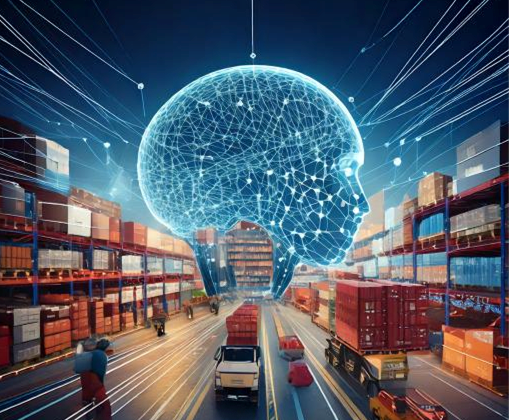Artificial intelligence (AI) is rapidly transforming the landscape of logistics and supply chain management. By leveraging AI’s power, businesses can achieve significant improvements in operational efficiency, customer service, and resource allocation. This blog dives into the how’s and why’s of AI in logistics, explores its use cases, and delves into future trends shaping the industry.
Why AI Matters in Logistics and Supply Chains:
- Enhanced decision-making: AI analyzes vast amounts of data, enabling data-driven decisions for optimized inventory management, route planning, and resource allocation.
- Improved efficiency: Automated processes and predictive capabilities minimize human error and streamline operations, leading to faster delivery times and reduced costs.
- Greater resilience: AI helps identify and mitigate potential disruptions, ensuring supply chains adapt to unexpected challenges.
- Enhanced customer service: Real-time tracking and predictive delivery estimates foster transparency and improve customer satisfaction.
Key AI Use Cases in Logistics:
- Demand Forecasting: AI algorithms analyze historical data and market trends to predict future demand, minimizing stockouts and overstocking.
- Optimized Route Planning: AI considers real-time traffic, weather, and delivery deadlines to generate the most efficient delivery routes, reducing fuel consumption and delivery times.
- Automated Warehousing: Robots and AI systems streamline processes like picking, packing, and sorting, improving accuracy and order fulfillment speed.
- Predictive Maintenance: AI analyzes sensor data to predict equipment failures, allowing proactive maintenance and minimizing downtime.
- Enhanced Customer Service: AI chatbots and virtual assistants provide real-time shipment tracking and answer customer inquiries efficiently.
AI Applications in Supply Chains:
- Predictive Maintenance: AI identifies optimal maintenance schedules for equipment, preventing costly disruptions and downtime.
- Supplier Relationship Management (SRM): AI analyzes supplier data to identify reliable partners and optimize procurement processes.
- Demand Forecasting: AI anticipates future demand based on historical sales data, market trends, and economic indicators, leading to better inventory positioning.
- Smart Procurement: AI analyzes supplier data in real-time to optimize inventory levels based on cost and reliability, streamlining procurement.
- Inventory Management: AI tracks physical goods throughout the supply chain, ensuring accuracy and minimizing errors.
- Enhanced Data Analytics: AI unlocks valuable insights from vast datasets, enabling data-driven decisions and improved performance.
- Collaboration and Integration: AI breaks down data silos, fostering improved communication and collaboration between departments.
Real-World Examples of AI in Action:
- Amazon: Utilizes AI for demand forecasting, analyzing sales data and customer reviews to predict customer preferences and adjust inventory levels accordingly.
- Logistics Companies: Implement AI-powered route optimization, reducing fuel consumption and optimizing delivery times by adjusting routes based on real-time traffic conditions.
Challenges and Considerations for AI Implementation:
- Data Quality and Availability: Reliable AI models require high-quality, clean data. Organizations must ensure accurate data collection and management practices.
- Data Dependence: AI models rely on specific datasets. Insufficient data or poor data diversity can hinder performance.
- Software Malfunctions: Bugs and errors in AI algorithms can lead to incorrect decisions. Thorough testing and monitoring are crucial.
- Budget Constraints: AI implementation can be expensive. Organizations should prioritize high-impact areas for adoption and explore cost-effective solutions.
Looking Forward: The Future of AI in Logistics:
- AI and Automation: Increased adoption of AI and automation will drive efficiency gains and cost reductions.
- 3D Printing and Localized Production: 3D printing technology will reduce reliance on long-distance transportation and enable local production, optimizing supply chain dynamics.
- Sustainable Practices: AI will play a role in tracking product origins and monitoring supplier practices, promoting ethical sourcing and sustainability.
- Enhanced Supply Chain Resilience: AI will support forward planning and risk mitigation, fostering stronger and more adaptable supply chains.
- Generative AI Applications: This emerging technology will offer solutions for product design optimization, resource allocation, and improved decision-making.
By embracing AI, logistics and supply chain organizations can unlock a world of opportunities. From enhanced efficiency and customer service to greater resilience and sustainability, AI is poised to revolutionize the industry. As AI technologies continue to evolve, we can expect even more innovative applications that will reshape the way we manage and deliver goods across the globe.
Ready to harness the power of AI to transform your logistics and supply chain operations? Visit Sakman Solutions at Sakman Solutions Website. We are a leading provider of AI-powered solutions designed to optimize your supply chain, boost efficiency, and empower you to navigate the future of logistics. Contact us today to learn more about how AI can help your business thrive.


Leave A Comment